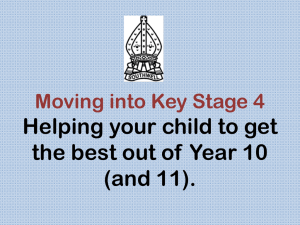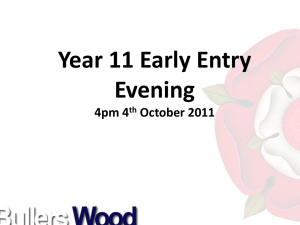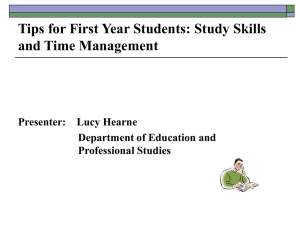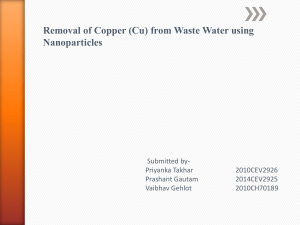GCSE Exam Information Evening
advertisement
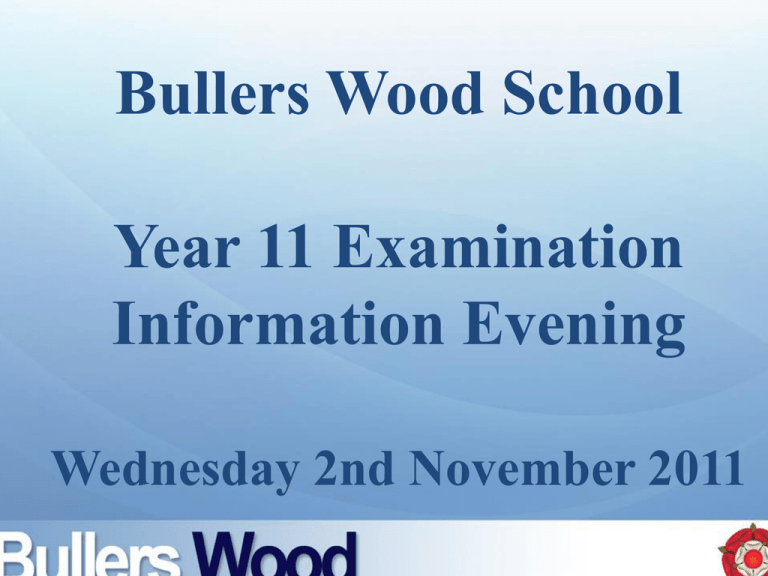
Bullers Wood School Year 11 Examination Information Evening Wednesday 2nd November 2011 She always leaves everything to the last minute – and it’s always when the printer is broken! She always says she has no work to do! There are a million websites to help but how do you know which are any good? I don’t understand all this course work, levels and modular exams – it’s completely different from when I was at school Reports Adult Literacy And Numeracy ALAN • Numeracy Level 2 – 23 points • Literacy Level 2 – 23 points Students achieving both Literacy and Numeracy is the equivalent to a B at GCSE Mock Examinations Targeted Intervention SAM Learning Secondary www.samlearning.com Login Login Centre ID: BR7BW User ID: ddmmyyii Password: e.g.160796SB Your Homepage Revision Exercise -Maths Topic Questions Student Progress Report Questions Please see Mrs. May at the end of the evening 1. Reading non-fiction: understand / presentation / language 2. Be able to write to describe, persuade, inform – three different types of writing www.englishbiz.co.uk Writing to describe – use all five senses: hearing, smell, taste, touch, feel. Using metaphors and similes to make your writing contain pictures (imagery) Writing to inform Writing that is clear, factual, straightforward, non-biased Writing that answers the questions: who, what, when, where, how Writing to argue/ persuade Emotional One sided biased 1. 2. 3. 4. 5. Make your sentences shorter: 12 words. Make some much shorter: 3 – 5 words. Use “and” less Join some sentences with “that”, “who”, “which” Write some 2 part sentences starting with “As …, …”, “Although …, …”, “When …, …” 1.Choose the right question: letters are most straightforward 2.Do a spider diagram of ideas, then number them 5-7 for paragraphing 3.Use: • Vivid description • Dialogue • Questions • Then & now – go from past tense into the present • For & against A small number of words make a big difference There are 3 easy ways to improve your spelling See Hear Memorise 1: Be-lie-ve 2: Bu-sin-ess 3: Se-para-te 4: Envi-ron-ment Hear 5: Govern+ment 6: Feb-RU-ary 7: Happen+ed 8: Sur+prise 9: Interesting 10: Accommodation 11: Skilful 12: Necessary GCSE MATHEMATICS 2011 -12 How is the Maths Department helping your daughter to prepare for her maths exams? • Revision materials have been sold including: Guides and workbooks Mathswatch CDs • Practice papers – marked regularly by staff and discussed with students • After school/lunchtime revision sessions may be offered What maths resources are available? There are numerous revision websites available but especially: Maths Watch The Maths Watch CD is an excellent revision resource that students can use at home We now also have Maths Watch on the VLE Click on the Maths Watch link in the left hand corner Your daughter’s teacher will go over exactly how to access Maths Watch on the VLE in class. The Maths area of school VLE has other resources specifically targeting D to C grade work C if U can! 10 STEPS TO SUCCESS How can you help your daughter to prepare for these important exams? • Make sure she has access to the appropriate revision materials – and encourage her to use them regularly • Encourage her look up the things she doesn’t know and to ask her teacher for individual help • Ensure that she is completing the practice papers to the best of her ability – and handing them in on time • Check her contact book to ensure that she is completing the whole paper • Make sure that she attends any specific revision sessions provided by her teacher Other good sites include ..... When are the exams? • All students are taking the LINEAR specification which comprises of TWO papers – one calculator and one non-calculator • All students (except the early entry students) will be entered for the March exams What happens after March? • Set 1 will begin studying for the FSMQ in Additional Maths • Students in Sets 5 and 6 (if they achieved grade C in the November exams) will transfer to Higher Tier and work towards a grade B or above in the June exams. • All other students will continue to study maths and prepare for the June exams. • Only once the results of the March exams have been issued, will discussions take place with individuals about possible resits or about using the time to concentrate on their other subjects. How do you know how well your daughter progressing? • Ask your daughter to show you the practice papers she completes and the marks/comments she receives. Help her to improve her performance on these papers by encouraging her to look up things she has forgotten and by testing her on key facts • Make sure she completes as much of the paper as she can and hands it in on time! How will you know how well your daughter is progressing? All students will be taking Mock GCSE Maths exams during Mock Exam week which is from 28 November to 3 December Students will be taking past GCSE exam papers and so the results of these will give you an up-todate picture of your daughter’s achievement in Maths in terms of a current GCSE grade. Is there anything else can you do to support your daughter? Please make sure they have all the necessary resources to support the learning - including their own calculator and suitable maths equipment Additional Science 2012 When are the exams? •January or June (most students) depending on group. Number of Papers 3 exam papers at Foundation or Higher • 1 x 45 minute Biology • 1 x 45 minute Chemistry • 1 x 45 minute Physics • ISA done in school What we are doing in school? Working through the syllabus in Biology, Chemistry and Physics. Doing lots of past paper questions. Doing ISAs. Setting homework regularly. Topics Biology Chemistry Physics Cells Plants Food Chains Waste Enzymes Bodies Inheritance Atoms Structures Properties Rates Energy Useful chemistry Movement Energy Momentum Static Electricity Circuits Mains Electricity Power Nuclear Reactions This label was taken from a cola drink. Great Taste! Ingredients • • • • • • Carbonated Water Sugar Colouring Phosphoric acid Preservative Flavouring The pH of this drink is 2.5 Which one of the ingredients in the cola drink causes the low pH? (1 mark) Draw a ring around the name of the ion that gives the cola drink its low pH. chloride hydrogen hydroxide sodium (1 mark) Read the article about the use of nanoparticles in sun creams. Sun creams Many sun creams use nanoparticles. These sun creams are very good at absorbing radiation, especially ultraviolet radiation. Owing to the particle size, the sun creams spread more easily, cover better and save money because you use less. The new sun creams are also transparent, unlike traditional sun creams which are white. The use of nanoparticles is so successful that they are now used in more than 300 sun cream products. Some sun creams contain nanoparticles of titanium oxide. Normal-sized particles of titanium oxide are safe to put on the skin. It is thought that nanoparticles can pass through the skin and travel around the body more easily than normal-sized particles. It is also thought that nanoparticles might be toxic to some types of cell, such as skin, bone, brain and liver cells. How is the size of nanoparticles different from normal-sized particles of titanium oxide? (1 mark) Suggest how the size of nanoparticles might help them to enter the body more easily. (1 mark) Give two advantages of using nanoparticles in sun creams. (2 marks) Why might nanoparticles be dangerous inside the body? (3 marks) THINK - EXAM TECHNIQUE! What you can do at home Take an interest. Encourage. Support us if we ring home. Make sure she brings work to lessons. Calculator to exams, etc. Helping with Mock Preparation Preparation for mocks: •Organisation. •Use of revision guide (£3.50). •Bitesize / SAM Learning. •AQA Website past questions. Core Science Module Resits Many students have core Science module resits on Tuesday 15th November. Saturday Science School 12th November. 8.50-1.00 Very successful in the past. Revision Classes Student Summary of Completed Course Work sent home in December Students need to meet or succeed target grades Once coursework completed the lesson time is used for revision Level 2 BTEC Information Revisin Classes Students need a merit to continue on to the level 3 Applied Learning Courses Students who receive Distinctions will already Have started the level 3 qualifications themes Level 2 BTEC Information Revision Classes Easter Holidays Attendance, Punctuality & Behaviour Empirical research shows that students with between 95 - 100% attendance are more likely to achieve 5+A*-C Grades at GCSE Structured Revision Sessions 4 at AS Level 3/4 at A2 Level General Studies Students need to gain at five A*-C grades at GCSE including English, and Mathematics……….. …..and a grade B in the chosen subject 5 GCSEs at Grade A*–C including English Sixth form Open Evening Tuesday th 8 November 2011 Year 11 Parents’ Evening Thursday th 12 January 2012

